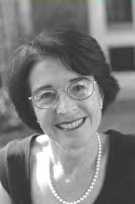| Women's Intellectual Contributions to the Study of Mind and Society Students, as part of an advanced seminar, examined and wrote about the lives of these women,
their intellectual contributions, and the unique impact and special problems that being female had
on their careers. |  |
| For information about referencing this paper - Click Here |
Nancy Chodorow
(1944- ) |  |
Nancy Chodorow was born on January 20, 1944, in New York, NY. Her father, Marvin, was a professor of applied physics. She married Michael Reich, a professor of economics had two children with him, Rachel and Gabriel, and was separated from him in 1977 (Haber, 2002).
A 1966 graduate of Radcliffe College, she earned her PhD in sociology from Brandeis University and received her psychoanalytic training at the San Francisco Psychoanalytic Institute. She received her PhD from Brandeis University in 1975. Chodorow has received fellowships from the Stanford Center for Advanced Study, the Guggenheim Foundation, the American Council of Learned Societies, and the National Endowment for the Humanities. In the year of 2000, she was the recipient of the Distinguished Contribution to Women and Psychoanalysis Award from the American Psychological Association. She was also awarded the L. Bryce Boyer Prize of the Society for Psychological Anthropology for her book The Power of Feelings: Personal Meaning in Psychoanalysis, Gender, and Culture. She is the author of four books, including The Reproduction of Mothering, for which she received the Jessie Bernard Award of Sociologists for Women in Society and which Contemporary Sociology listed in the 1990's among the ten most important books of the past twenty-five years (Haber, 2002).
Throughout her life Chodorow has been a sociologist, psychoanalyst, and an educator. Her academic career started in 1973 when she taught Women's Studies at Wellesley College, she then became Assistant Professor of Sociology (from 1974-1986) at Santa Cruz. For her first published work, she received the Jessie Bernard Award in 1979. She is a Fellow of the Russell Sage Foundation, Center for the Advanced Study of Behavioral Sciences, member of the American Sociological Association, and the National Women's Study Association. She is best known for her work on the central role that mothers play in child rearing and for her emphasis of the family as the primary location for gender socialization. She has made significant contributions to the feminist theory with her reappraisal of the ways in which the psychological dynamics of the gender system is subject to historical change and development (Rhode, 1990).
Chodorow's most influential book is thought to be, Psychoanalysis and the Sociology of Gender. In this book, she challenges the traditional view that females are biologically predisposed toward nurturing infants. She argues that mothering, fulfills a woman's psychological need for reciprocal intimacy. Chodorow also describes the difference in the mother's relationships with their sons as apposed to their daughters. She states that mothers are close with their infant sons, but they view their male children as different and do not share with them the same sense of "oneness" that they experience with their daughters. She claims that mature males that are unaccustomed to a psychologically intimate relationship are, therefore, content to leave mothering to women (Haber,2002).
Chodorow's thinks that object-relations theory is a gender identity formation and is largely a result of the dynamics of family relationships. She has different views on the oedipal stage of childhood. She argues that a girl's pre-oedipal bond with her mother can continue after she develops a fascination with her father. Chodorow also believe that in the preoedipal stage, the infant experiences a primary identification with the mother and forms a primary love for the mother that makes no differentiation between the child's needs and the ability of the mother to fulfill them. Gradually the child establishes a sense of self through an expanded awareness of its own physical self. The child begins to differentiate from the mother as it becomes less dependent upon her. She emphasizes the impact of same-gender mothering on the psychosocial development of girls as well as boys (Flax, 1993).
Chodorow believes that psychoanalysis cannot make universal claims that concern psychological development. They must take into account the cultural and historical conditions of the present time. She characterizes Freud's work as only sometimes describing how women develop in a patriarchal society. Instead of his work arising out of clinical observation, Chodorow illustrates Freud's work as making unsupported statements about how women and men "ought to be"(Flax, 1993).
Chodorow is often appointed as a leading theorist in feminist thought, especially in the field of psychoanalysis and feminist psychology. Her essays are included in many books concerning gender roles and construction as well as psychoanalysis. Her evaluations of the ways in which the psychological dynamics of the gender system is systematically generated and subject to historical change and development, are acknowledged as significant contributions to feminist theory. Chodorow is now at the University of California at Berkeley, and she continues her controversial theories that psychoanalysis and feminism have generated (Rhode, 1990).
References
- Flax, Jane. (1993). Disputed Essays on Psychoanalysis Subjects Politics and Philosophy. New York: Routledge.
- Haber, Art. (2002). Habert's Art. Reviews: Nancy Chodorow's Biological Clock. Retrieved October 7, 2002, from http://wwwhaberarts.com/chodorow.htm
- Rhode, Deborah L. (1990). Theoretical Perspectives on Sexual Difference. Binghampton: Vail-Ballou Press.
Back to Women's Page

